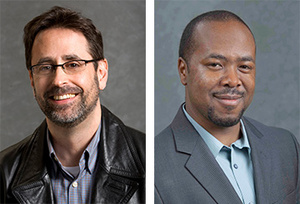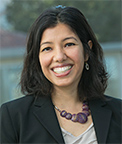
By Andrew Cohen
Clinical Professor Jeff Selbin calls Berkeley Law’s Thelton E. Henderson Center for Social Justice “the conscience of the law school.” Assistant Professor Bertrall Ross describes it as “central to the school’s public mission.” Finding inspiration, it seems, won’t be an issue for the center’s new faculty co-directors.
The intellectual hub of Berkeley Law’s vibrant social justice community, the Henderson Center prepares budding lawyers to represent underserved communities. It also produces innovative and accessible scholarship on issues of race, gender, and poverty.
Selbin and Ross will help Executive Director Dimple Abichandani plan events, support student training, and bring in advocates and scholars to engage students on diverse public interest matters. In doing so, they also hope to expose them to myriad public interest career opportunities.
The center will hit the ground running this fall, with a compelling lineup of speakers for its Ruth Chance Lecture Series. These speakers will bring varied perspectives to the series theme of “The Next 50,” which probes the future of civil rights and social justice 50 years after passage of the Civil Rights Act and the March on Washington. The series honors Ruth Chance ’31, the only woman in her graduating class and a noted historian, sociologist, and youth advocate who worked to combat poverty, class, and race discrimination.
“This is a very exciting time for the Henderson Center, which will continue to offer and refine our core programming for law students and the broader Berkeley Law community,” Abichandani said. “We know that Berkeley Law students will shape the next 50 years of work to expand opportunity for all. Our programming will be aimed at helping them develop their vision for how they can use their legal education to create a more just world.”
Selbin is familiar with that mission, having served on the center’s executive committee since 2005. He is also the faculty director of the East Bay Community Law Center (EBCLC), Alameda County’s largest provider of free legal services to low-income citizens.
On October 16-17, the Henderson Center and EBCLC will co-sponsor a major symposium on antipoverty lawyering 50 years after the War on Poverty—and 25 years after EBCLC’s founding by Berkeley Law students. Selbin sees the event as a harbinger of closer collaboration in the years ahead.
Big shoes to fill
Abichandani, Selbin, and Ross all hailed the work of outgoing faculty director Mary Louise Frampton, a prominent civil rights lawyer and longtime center mainstay. “Our job is to build on Mary Louise’s incredible work,” Selbin said. “We owe her a huge debt of gratitude for many years of tireless and inspiring leadership.”

Abichandani
Ross, who teaches Legislation, Election Law, and Constitutional Law, noted that the Henderson Center offers valuable training to all Berkeley Law students—not just those intending to become social justice advocates.
“Very few of our students have a single-minded focus on any particular career when they come in to the law school,” he said. “The center provides exposure to the diverse opportunities that exist within the law for students who eventually pursue public interest careers and for corporate lawyers who seek to advance the public interest through their pro bono and other works.”
Exploring new avenues for impact, the Henderson Center is crafting a new program called the Social Justice Innovation Lab. This endeavor aims to generate new approaches and experimentation in solving some of the nation’s most persistent social justice challenges.
The American Bar Association’s Model Rules of Professional Conduct state that every lawyer is a “public citizen having special responsibility for the quality of justice.” Under California law, it is the duty of all lawyers “never to reject…the cause of the defenseless or the oppressed.” Through its programming and example, the Henderson Center, open to all Berkeley Law students, works to embody and advance these core obligations.
“Dimple is an exceptionally talented executive director with exciting ideas,” Selbin said. “The center will deliver high-quality programming, coupled with new initiatives, to keep Berkeley Law at the forefront of training and supporting the next generation of social justice lawyers.”